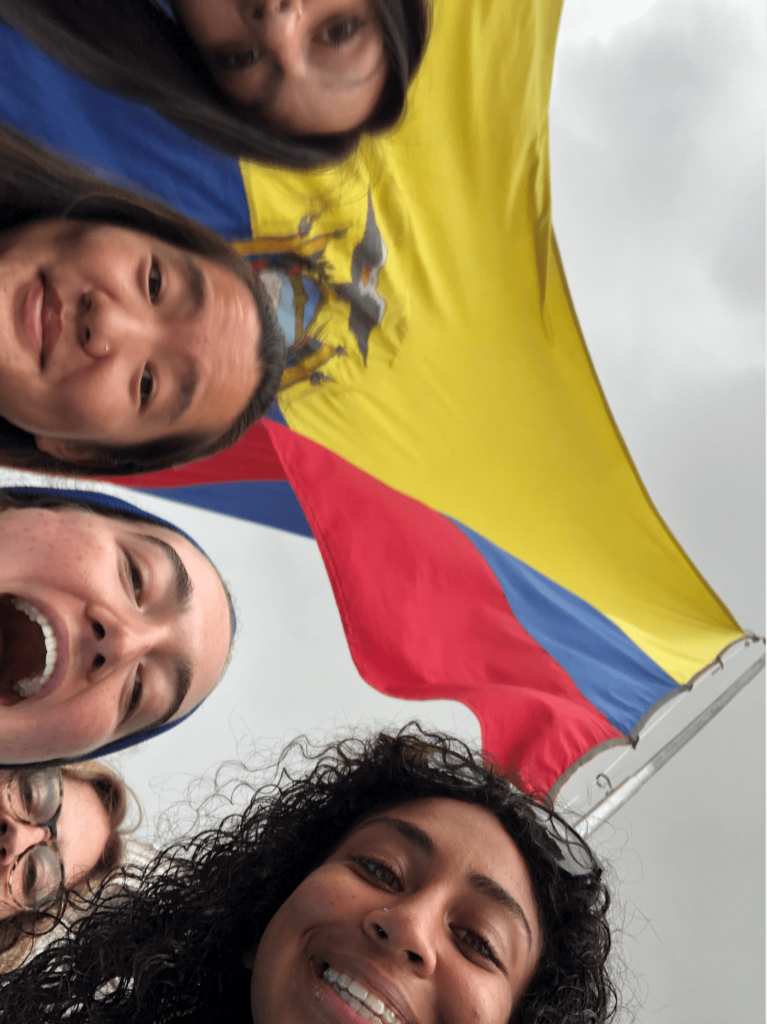
Spanish. They say it is one of the easiest languages for native English speakers to learn. However, I would argue it’s anything but easy. With no prior Spanish knowledge until high school (save for your occasional hola and adíos), the personal growth regarding communication abroad has been significant, but at the same time, a slow and steady process.
BC in Quito requires language classes up to Intermediate II. Thus once I completed my spanish requirements for the program- I figured I’d be prepared enough to navigate daily life, and what I didn’t know, I could learn in Ecuador. Well, I was right about the latter.
It’s one thing to write an essay or pass a test, but it’s another thing to partake in animated conversations, to express emotion, to understand the flow of daily communication in Spanish. Similar to stages of grief, there’s definitely some defining emotional stages I went through when first attempting to overcome the language barrier in Ecuador.

Stage One: I cannot understand anything that is happening.
This stage began the moment I stepped off the plane. I was picked up from the airport, was able to understand “buenas noches”, and that was where my comprehension ended. This was me realizing that my host family’s dog understood more spanish than I did.This is the point of time filled with smiling and nodding after you have already asked twice for someone to repeat a question. As a new exchange student, you are trying to remember the names of people and places, but also knowing that repeating a name is half the challenge. This is going home at the end of every day, not knowing if it is the altitude or the constant Spanish that is making your brain so exhausted. After a few weeks, stage two slowly begins to take shape.
Stage Two: This isn’t so bad, I’m slowly but surely progressing.
For some of us, this stage came with using our first Ecuadorian slang (“chévere”) in a sentence. For others, it meant being able to distinguish the various Ecuadorian dishes on a menu (“llapingachos” from “locro”). The rapid fire questions of store associates or waiters no longer start to feel like such rapid fire, and the unique linguistic styles of our host families become a familiarity. In other words, their Spanish is a source of ‘comfort Spanish’, in that you know you will be able to gather the gist of any conversation you have with them. However as the weeks passed… discouragement took shape.
Stage Three: I’m am simply illiterate:
Your brain lets go of English, but also is not quite grasping the Spanish. In this stage, I felt as if I was plateauing or even decreasing in my Spanish abilities. Following class lectures (which are all in Spanish) remained a battle, but oddly enough, talking with people from back home also became a bit of a challenge, in that you just can’t seem to find the words in English to describe your current life. Frustration set in, as the so-called “fluency” that is spoken of when people go abroad seems like a distant reality. My brain wanted the facility of listening and speaking, without having to utilize the conscious part of the mind. Yet in due time, I reached a critical stage.

Acceptance:
This came with realizing how far I’d come and savoring the place in which I was at. In other words, it’s all about taking the wins with the losses, and realizing that the so-called losses are just growth opportunities. For example, when I asked what type of seagull a restaurant served, I could see it as a humiliating mistake, or I could embrace it as a funny moment to which I will never forget the word for noodle again (noodle is fideo, not gaviota). Or, when I have all four of my co-workers laughing because of certain pronunciations: I could refuse to talk in the workplace again, or I could welcome the joy that it brings those around me. That is to say, when else is it socially acceptable to have the linguistic level of a 3rd grader at 21 years old? Being able to communicate is more than words, and people can understand the language of the heart, even if it comes with subpar conjugation capabilities.
Learning a language is a slow, non-linear process, but we must realize that it is an honor and a privilege to learn and communicate with people in their first-language. As the late and great Nelson Mandela once said, “If you talk to a man in a language he understands, that goes to his head. If you talk to him in his language, that goes to his heart,”. Hasta la próxima vez, ¡que te vaya muy bien!